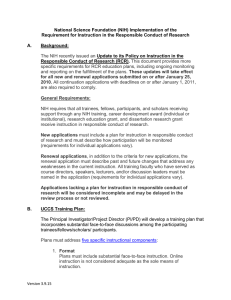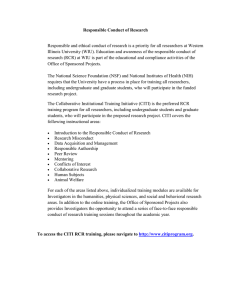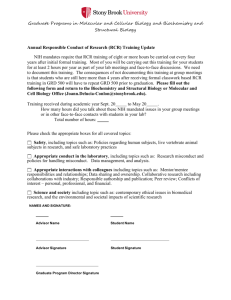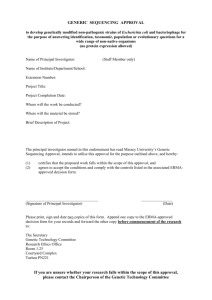Document 11129962
advertisement
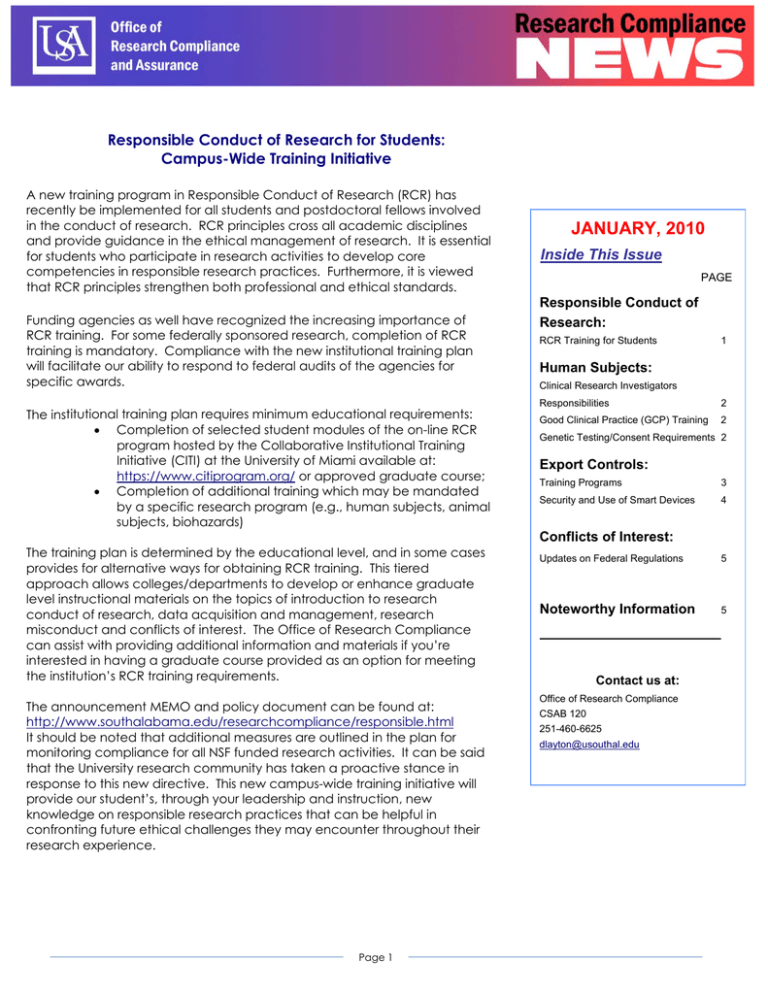
Responsible Conduct of Research for Students: Campus-Wide Training Initiative A new training program in Responsible Conduct of Research (RCR) has recently be implemented for all students and postdoctoral fellows involved in the conduct of research. RCR principles cross all academic disciplines and provide guidance in the ethical management of research. It is essential for students who participate in research activities to develop core competencies in responsible research practices. Furthermore, it is viewed that RCR principles strengthen both professional and ethical standards. Funding agencies as well have recognized the increasing importance of RCR training. For some federally sponsored research, completion of RCR training is mandatory. Compliance with the new institutional training plan will facilitate our ability to respond to federal audits of the agencies for specific awards. The institutional training plan requires minimum educational requirements: Completion of selected student modules of the on-line RCR program hosted by the Collaborative Institutional Training Initiative (CITI) at the University of Miami available at: https://www.citiprogram.org/ or approved graduate course; Completion of additional training which may be mandated by a specific research program (e.g., human subjects, animal subjects, biohazards) JANUARY, 2010 Inside This Issue PAGE Responsible Conduct of Research: RCR Training for Students 1 Human Subjects: Clinical Research Investigators Responsibilities 2 Good Clinical Practice (GCP) Training 2 Genetic Testing/Consent Requirements 2 Export Controls: Training Programs 3 Security and Use of Smart Devices 4 Conflicts of Interest: The training plan is determined by the educational level, and in some cases provides for alternative ways for obtaining RCR training. This tiered approach allows colleges/departments to develop or enhance graduate level instructional materials on the topics of introduction to research conduct of research, data acquisition and management, research misconduct and conflicts of interest. The Office of Research Compliance can assist with providing additional information and materials if you’re interested in having a graduate course provided as an option for meeting the institution’s RCR training requirements. The announcement MEMO and policy document can be found at: http://www.southalabama.edu/researchcompliance/responsible.html It should be noted that additional measures are outlined in the plan for monitoring compliance for all NSF funded research activities. It can be said that the University research community has taken a proactive stance in response to this new directive. This new campus-wide training initiative will provide our student’s, through your leadership and instruction, new knowledge on responsible research practices that can be helpful in confronting future ethical challenges they may encounter throughout their research experience. Page 1 Updates on Federal Regulations 5 Noteworthy Information 5 Contact us at: Office of Research Compliance CSAB 120 251-460-6625 dlayton@usouthal.edu Protecting Human Subjects: Clinical Research Investigator Responsibilities The FDA has issued the final versions of a guidance document “Investigator Responsibilities – Protecting the Rights, Safety and Welfare of Study Subjects” in October, 2009. The overall goal of the guidance is to help research investigators better meet their needs with respect to the protection of human subjects and ensuring the integrity of data from clinical investigations. Although the guidance is not legally enforceable, it does describe the agency’s current thinking on a topic and such advice should be followed. The guidance highlights the investigator’s responsibilities for providing reasonable medical care for study subjects for medical problems arising during participation in the trial that are, or could be, related to the study. Furthermore, providing reasonable access to needed medical care, either by the investigator or by another qualified individual, such as when the investigator is unavailable or when specialized care is needed. During any period of unavability, the Good Clinical Practice Training Good clinical Practice (GCP) is an internationally accepted standard for the design, conduct, record keeping and reporting of clinical trials. These guidelines are derived from the International Conference on Harmonization. GCP training involves key principles and practices. Knowledge of these standards will help ensure that trials conducted under the auspices of the University meet those expectations that are associated with excellence in the conduct of clinical research. To provide GCP training for faculty and key research personnel, the Collaborative Institutional Training Initiative (CITI) online program is available at: https://www.citiprogram.org/ Continuing credits for physicians, physician's assistants, nurses, and other health care providers are available through the University of Miami Miller School of Medicine, Division of Continuing Medical Education. AMA PRA Category 1 credits can be obtained by completion of the GCP Course (4 credits). See the CITI website for more information. Page 2 investigator should delegate responsibility to medical care of study subjects to designated qualified physicians who will be available to subjects during that time. Furthermore, the investigator must be readility available by telephone or other electronic communication 24 hours a day, as well as in reasonably close proximity to subjects. Additionally, the guidance provides information on how investigators should oversee the studyrelated activities of persons not in the direct employ of the investigators such as study staff conducting testing and assessments. The final guidance document is located at: http://www.fda.gov/downloads/Drugs/Guidance ComplianceRegulatoryInformation/Guidances/U CM187772.pdf Federal Genetic Information Law – NEW IRB Consent Requirements The IRB has recently revised its consent language for studies involving genetic testing. The Genetic Information Nondiscrimation Act (GINA) prohibits group health plans and health insurers from denying coverage to a healthy individual or charging that person higher premiums based solely on a genetic predisposition to developing a disease in the future. Additionally, the GINA law prohibits employers from using individuals' genetic information when making decisions to hire, fire or promote. The prototype language to be included in the consent forms of all studies involving the collection of specimens is for ANY genetic evaluation. This information was revised in order to simplify wording. Additionally, subjects should receive an information sheet which provides a detailed listing of protections afforded under the GINA law. These documents can be located on under the consent form toolkit posted on the human subject’s website. EXPORT CONTROLS TRAINING ♦ ♦ ♦ ♦ ♦ ♦ ♦ ♦ Are you involved research? Do you have any plans to travel internationally? Do you ever ship items internationally? Do you ever purchase items internationally? Do you fill out paperwork for any of the above activities? If you answered "yes" to any of the above then you need to be aware of a set of Federal Regulations known as Export Control Laws. These rules apply to items and information that is sent overseas, or even to persons or businesses in the United States that may be subject to them. The Office of Research Compliance and Assurance is here to offer assistance, but you need to know if you need it! Seminars on the Basics of Export Controls are being offered around campus during the semester. Any interested faculty, staff, or student is free to attend any session: 02/09/2010 02/18/2010 03/22/2010 04/14/2010 9:30 AM - 11:30 AM 12:30 PM - 1:45 PM 1:30 PM - 3:30 PM 9:30 AM - 11:30 AM Mitchell Cancer Institute Engineering 270 COM Conference Room Main Campus Library, Room 181 Sessions will be offered throughout the Spring as long as interest is present. If you would like a presentation to a division please contact us to coordinate for your group. Workshop registration is required no later than one week in advance of a scheduled session. You may register for one of these workshops at: https://jagmail.usouthal.edu/cgi-bin/CA/seminar/semrca.cgi You will need your Jag number and email address to log into the system. Please contact Alison Henry for any questions. ahenry@usouthal.edu or 460-6509 ♦ ♦ ♦ ♦ ♦ ♦ ♦ ♦ Page 3 Speaking of Export Controls… When you travel out of the country on University business now, you are being asked fill out what is called a “TMP” or Temporary Export Form for all “USA-Owned Laptops, PDAs, Cell Phones, Digital Storage Devices and Encrypted Software”. Officials have been receiving quite a few questions as to why this is necessary and what it is trying to accomplish. Believe it or not, lots of everyday things that we count on are subject to laws referred to as export controls (meaning there are purchase, mailing, and use restrictions on people that are not U.S. citizens). So, if my iPod, cell phone, and HP laptop are subject to export controls then why didn’t I have to prove that I am a U.S. citizen to buy them? Simply, there is a mass market exemption on most products out there. A good rule of thumb, if you can purchase the item from a place like Amazon.com or Best Buy that means that any one could purchase and use it. You just can’t give out information on how to make one, which would be considered a trade secret anyway. What many people do not realize is just how “smart” the “smart phone” has become and just how much personal information people store on them. Both issues together make a perfect storm for items to present a wealth of information and/or a darn good tool should they fall into the wrong hands. Think for a moment…do you access work email on your Blackberry…do you have your iTunes linked up as an app so that you can easily make purchases…just what is it that you have loaded that someone could access with the touch of a screen? On top of that, the encryption on many smart phones can reach in to the 100’s of bits when export control laws cover everything over 64 bits (see the Commerce Control List Category 5, Group D). What does that mean? Every time you open, for example, a Windows operating system after 2000 it is subject. Keep in mind, as far as export controls are concerned, it isn’t necessarily what you intend to do with an electronic device; it is what it is capable of doing. Take a look at this article from Computer World discussing current security issues with popular “smart” devices: http://www.computerworld.com/s/article/345297/Smartphones_Need_Smart_Security The TMP form is just having you promise that you only intend to take the university owned, electronic device with you as a “tool of the trade.” You won’t take it to certain places (such as a sanctioned nation like Iran or Cuba) and that if it were to break; you would be it back to be serviced. Also, that you don’t intend to let it out of your control and that all software loaded on to the computer are “mass market” products. Is the device your personal device? The US government assumes that you follow the same rules as a responsible citizen unrelated to employment or ownership. So, go ahead and fill out the form for your personal items too. Have it with you as you go through customs to present should someone ask. Page 4 began last May, when the NIH issued a advance notice of proposed rule making on the federal regulation on conflict of interest. Stay tuned for additional information regarding these changes and how they will affect our institutional policy on conflicts of interest. Update on Federal Regulation: Conflicts of Interest The fiscal 2010 Omnibus Appropriations Act (Pub. L. No. 111-117) is slated to provide $31 billion in NIH funding, or 2.3% more than in year 2009, as noted in the NIH Office of Extramural Research's January newsletter, Nexus. This act requires, by May 1st, the secretary of the Department of Health and Human Services, "to amend regulations at 42 CFR Part 50 Subpart F for the purpose of strengthening federal and institutional oversight and identifying enhancements, including requirements for financial disclosure to institutions, governing financial conflicts of interest among extramural investigators receiving grant support from the National Institutes of Health." These efforts * RCR Training Workshop: Responsible Authorship and Publication Practices Presented by: Russ Lea, Ph.D., VP for Research SESSIONS: Monday, March 8th 9:00-10:30 am - OR Wednesday, March 24th 1:00-2:30 pm WHERE: UCOM 3901 To register go to https://jagmail.usouthal.edu/cgibin/CA/seminar/semrca.cgi * * Noteworthy News * * * Truth of the MMR vaccine scandal, Times Online, UK, Jan 24, 2010 "After an epic misconduct hearing, the doctors who caused panic over the vaccine are about to learn their fate. A report on the greatest health scare of recent times…" Mass. doctor accused of fraud by faking research, WTOP.com, Jan 14, 2010 "…Prosecutors allege the former chief of acute pain at Baystate Medical Center in Springfield sought and received research grants from pharmaceutical companies but never performed the studies. He fabricated patient data and submitted information to anesthesiology journals that unwittingly published it, court documents allege…" DHHS Office of Research Integrity Newsletter, December, 2009. http://ori.hhs.gov/documents/newsletters/vol18_no1.pdf OIG Finds Conflict of Interest Oversight Lacking for NIH Research The report, released Nov. 19, calls for grantee institutions to provide details to NIH regarding the nature of all reported financial conflicts of interest and how they are managed, reduced or eliminated. "There is a need for more transparency about and oversight of grantee institutions," the OIG report said. "Increased oversight is needed to ensure that these conflicts are managed appropriately, the research conducted using federal funds is not biased by any conflicting financial interests of researchers, and human subjects are not subjected to unnecessary risks." SENATOR, RESEARCHERS QUESTION GHOSTWRITING, INDUSTRY INFLUENCE “Drugmakers' relationships with researchers who permit their names to be used to promote products continue to come under fire from both the private and public sectors. Sen. Chuck Grassley (R-Iowa), who has a long track record of advocating for transparency in the relationships drugmakers have with physicians and academic institutions, sent a letter recently to 10 medical schools, inquiring about their policies on ghostwriting and comparing the practice to plagiarism”. Newsletter archives are available through the Office of Research Compliance website at: http://www.southalabama.edu/researchcompliance/index.html Page 5
